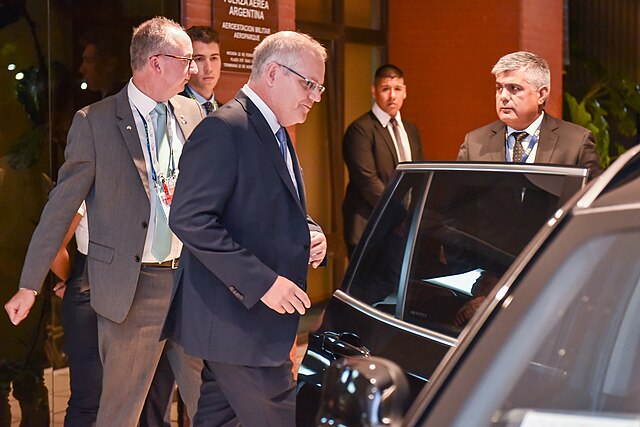

Former Prime Minister Scott Morrison has used a speech as a call to arms for the final frontier. He proposes expanding AUKUS with a new space-based arm. So who benefits if this goes ahead? Here’s what to add to your watchlist.
Since his re-election, US President Donald Trump has pushed for his nation to step up its work in space as part of what he dubs the “golden dome”.
After all, who knows more about having a golden dome than Trump?
The golden dome project is the code-name for a satellite defence project designed to protect critical communications and military infrastructure. Protect it not so much from aliens, but from hostile closer to home like China and/or Russia who could attack space-based infrastructure to disrupt everything from GPS to local communications both for civilians and the military.
Attacks could include kinetic actions that would disable the physical satellites and other hardware, or cyberattacks that would render them inert. There’s even suggestions that these satellites could be targeted by hostile laser or microwave blasts from hostile infrastructure to take them offline.
While still in development, the golden dome is expected to combine hardened satellite networks, advanced surveillance capabilities, and rapid-response systems that can detect and respond to attacks in real time.
It’s a big-shift in how America thinks about space, and former PM Scott Morrison wants Australia to lend a hand on the final frontier.
Since his defeat at the 2022 Federal Election, Scott Morrison has been keeping busy. Among his other responsibilities, he’s now the Chair of the Advisory Board for Space Centre Australia. It’s the organisation building the “Cape Canaveral” of Australia in Cape York.
He gave a speech in Sydney yesterday - more of a rousing call to futuristic arms - saying that Australia should add a new pillar to the controversial AUKUS deal. The new AUKUS Pillar 3 would see Australia combine space capabilities with our other allies in the deal - the US and UK - to:
ScoMo warned in his speech that without these sorts of space capabilities, Australia would be at risk of hostile actions the golden dome project is looking to defend against.
So what does all of this have to do with your portfolio? A lot, actually!
Multi-billion dollar government military defence contracts have a tendency to move markets. And with a former PM - of whom Trump is actually familiar with - calling for a new plank to be added to the latest and richest of these deals is a pretty material market event.
Over the next financial decade, the government is projected to spend over $50 billion on Defence. And every time we see a new Federal Budget, the numbers keep going up. In fact, according to ANZ, in 2020 Australia’s military spending is now higher than it’s been since the Vietnam War. By 2030, it’s expected to grow to 3.5% of GDP.
All of that money has to go somewhere, and as we’ve seen from the submarine deal we called off with the French, Aussie leaders would rather see that money go to Aussie companies wherever possible.
Companies picked to work on AUKUS projects have already taken off, despite work not yet getting underway. When AUKUS was first announced, we saw the uranium sector get a bump, as well as Aussie steel companies.
Bisalloy, for example, surged 40% on the news of deals awarded to it through AUKUS.
So, which sectors should you be watching?
I mean, duh. When Golden Dome was announced we saw bumps in US military contractors such as Raytheon and Northrop Grumman.
This one’s kind of a no-brainer, but definitely do your research on which companies are best suited to you.
Advanced manufacturing firms, particularly those involved in high-precision fabrication, composites or ballistic materials, have also rallied on the back of defence-linked announcements.
Companies involved in additive manufacturing and advanced composites used in aerospace or armoured vehicles often benefit from being shortlisted or named as technology partners in procurement pipelines.
Steelmakers and heavy materials suppliers tend to be cyclical beneficiaries. When military infrastructure projects ramp up—whether it’s new shipyards, airbases, or spaceports—demand for domestic steel and fabricated materials rises.
The market usually rewards companies that signal they’ve been approached for tenders or materials supply tied to long-duration projects.
Aerospace and satellite-adjacent companies also see a tailwind from military communications and surveillance programs.
When programs involving space domain awareness or sovereign satellite systems are flagged, investors often rotate into firms already working on orbital payloads, launch support, or communications tech with crossover applications.
Cybersecurity and defence-aligned software players are also closely watched. Especially considering projects like Golden Dome specifically call out cyber-hardening as an objective.
Any move toward hardened communications networks, classified satellite systems or space-based electronic warfare opens the door for companies offering secure data, access control and encryption infrastructure.
Lastly, infrastructure and logistics providers can see indirect benefits. Submarine base upgrades, launch facility developments or northern base expansions often require significant civil construction and logistics support.
Investors tend to reward those with a footprint in strategic locations or existing federal infrastructure contracts.